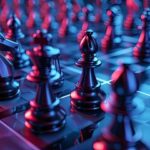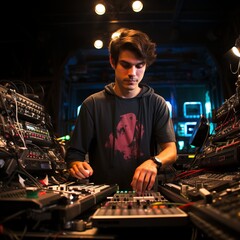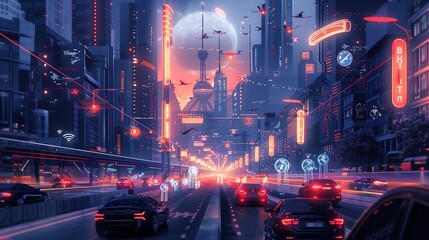The beauty industry, traditionally rooted in artistry and craftsmanship, is experiencing a profound transformation through the integration of artificial intelligence (AI). What once was a field dominated by manual processes and subjective interpretations is now being revolutionized by data-driven algorithms, machine learning, and AI technologies. This digital shift is not just enhancing the efficiency of the industry but is also paving the way for unprecedented levels of personalization, innovation, and consumer engagement. AI is rapidly infiltrating the beauty industry, reshaping product conception, personalization, marketing, and manufacturing in ways that were unimaginable just a few years ago.
Table of Contents
ToggleAI in Product Conception: Revolutionizing Beauty Innovations
In the past, product development in the beauty industry was largely a trial-and-error process, guided by intuition, experience, and consumer feedback. However, with the advent of AI, this process has become more precise, efficient, and innovative. AI technologies can analyze vast amounts of data, including consumer preferences, skin types, and emerging trends, to predict what products will resonate with the market. This data-driven approach allows beauty companies to create products that are more aligned with consumer needs and preferences.
For instance, AI algorithms can analyze social media trends and consumer reviews to identify gaps in the market. This analysis can then guide the development of new products that address unmet consumer needs. Additionally, AI can simulate product formulations, predicting how different ingredients will interact with each other and with various skin types. This capability not only speeds up the product development process but also ensures that the final product is safe, effective, and well-suited to its target audience.
Moreover, AI is enabling the creation of hyper-personalized products. By analyzing individual skin conditions, lifestyle factors, and even genetic information, AI can help formulate products that are uniquely tailored to each consumer. This level of personalization is revolutionizing the beauty industry, allowing companies to offer products that are not just broadly effective but are optimized for individual use.
Also Read: The Future of AI in the Telecom Industry
Personalization Through AI: Tailoring Beauty Experiences
One of the most significant impacts of AI in the beauty industry is the ability to offer personalized experiences. In a market where consumers are increasingly seeking products and services that cater to their unique needs, AI provides the tools to deliver on this demand. Personalization in the beauty industry extends beyond product formulation; it encompasses every aspect of the consumer experience, from product recommendations to virtual try-ons.
AI-powered beauty apps and devices are becoming increasingly popular, allowing consumers to receive personalized skincare advice, makeup recommendations, and even virtual makeovers from the comfort of their homes. These technologies use AI to analyze images of the consumer’s face, identifying skin conditions, facial features, and other factors to provide tailored recommendations. For example, an AI-powered app might suggest a specific foundation shade based on the user’s skin tone or recommend skincare products that address their particular concerns, such as acne or dryness.
In addition to product recommendations, AI is enhancing the shopping experience through virtual try-on technology. This technology allows consumers to see how different products will look on their skin before making a purchase. By using augmented reality (AR) and AI, these tools create a virtual mirror where users can try on makeup products, such as lipstick or eyeshadow, and see how they will look in real life. This not only makes shopping more convenient but also reduces the uncertainty that often comes with buying beauty products online.
Furthermore, AI-driven personalization extends to customer service. Beauty brands are increasingly using AI-powered chatbots and virtual assistants to provide personalized support and guidance to consumers. These tools can answer questions, offer product recommendations, and even assist with the purchase process, all while providing a seamless and personalized customer experience.
AI in Marketing: Targeting and Engaging Consumers More Effectively
Marketing in the beauty industry has always been about understanding consumer desires and creating campaigns that resonate with them. However, the introduction of AI has taken marketing to new heights, enabling beauty brands to target and engage consumers more effectively than ever before. Through the use of AI, beauty companies can analyze consumer behavior, predict trends, and create highly targeted marketing campaigns that drive results.
One of the key ways AI is transforming marketing in the beauty industry is through predictive analytics. By analyzing data on consumer behavior, AI can predict which products are likely to be popular in the future and identify the target audience for these products. This allows beauty brands to create marketing campaigns that are not only timely but also highly relevant to their audience. For example, if AI analysis indicates that a particular demographic is interested in clean beauty products, a brand can tailor its marketing efforts to target this group with specific messaging and product offerings.
AI is also enhancing the way beauty brands interact with consumers on social media. Social media platforms generate massive amounts of data every day, and AI can sift through this data to identify trends, monitor brand sentiment, and engage with consumers in real time. AI-powered tools can analyze social media posts, comments, and reviews to gain insights into consumer preferences and perceptions. These insights can then be used to refine marketing strategies, create more engaging content, and respond to consumer feedback more effectively.
Moreover, AI is enabling more personalized and dynamic advertising. By analyzing consumer data, AI can create personalized ads that are tailored to individual preferences and behaviors. For example, an AI-driven ad might show a consumer a product they have previously shown interest in or suggest a complementary product based on their purchase history. This level of personalization increases the likelihood of conversion and enhances the overall consumer experience.
AI in Manufacturing: Enhancing Efficiency and Quality
The impact of AI in the beauty industry is not limited to product development and marketing; it is also transforming the way beauty products are manufactured. AI technologies are being integrated into manufacturing processes to improve efficiency, ensure quality, and reduce waste. This is particularly important in an industry where product quality and consistency are paramount.
AI-driven automation is playing a key role in modernizing beauty manufacturing. Robotics and AI-powered machines are increasingly being used to perform tasks that were once done manually, such as mixing ingredients, filling bottles, and packaging products. This automation not only speeds up the manufacturing process but also reduces the risk of human error, ensuring that products are made to exact specifications every time.
In addition to automation, AI is being used to monitor and optimize the manufacturing process in real-time. AI-powered systems can analyze data from sensors and machines on the production line to detect any anomalies or inefficiencies. If an issue is detected, the AI system can automatically adjust the process to correct it, minimizing downtime and ensuring that the final product meets the highest standards of quality. This real-time monitoring also allows for greater flexibility in the manufacturing process, as adjustments can be made quickly in response to changing conditions or demands.
AI is also contributing to sustainability efforts in the beauty industry. By optimizing manufacturing processes and reducing waste, AI is helping beauty companies minimize their environmental impact. For example, AI can optimize the use of raw materials, ensuring that the right amounts are used and reducing excess. Additionally, AI-driven predictive maintenance can help extend the life of manufacturing equipment, reducing the need for replacements and lowering the environmental footprint of production.
The Future of AI in the Beauty Industry
As AI continues to evolve, its impact on the beauty industry is likely to grow even more profound. The opportunities for innovation and improvement are vast, from creating entirely new types of beauty products to revolutionizing the way consumers interact with brands. However, the integration of AI also presents challenges that the industry must address.
One of the key challenges is the need for transparency and ethical considerations in the use of AI. As AI becomes more deeply integrated into the beauty industry, consumers are likely to demand greater transparency about how their data is being used and how AI-driven decisions are made. Beauty brands will need to ensure that they are using AI in a way that is ethical, transparent, and aligned with consumer expectations.
Another challenge is the potential for AI to disrupt traditional roles within the beauty industry. As AI takes over tasks that were once performed by humans, there may be concerns about job displacement and the loss of traditional skills. The industry will need to find ways to balance the benefits of AI with the need to preserve human expertise and creativity.
Despite these challenges, the future of AI in the beauty industry is undoubtedly bright. AI has the potential to unlock new levels of innovation, efficiency, and personalization, transforming the industry in ways that are only beginning to be understood. As beauty brands continue to explore and integrate AI technologies, they will be able to offer consumers more personalized, effective, and engaging products and experiences.
In conclusion, AI is rapidly infiltrating the beauty industry, reshaping every aspect of the field from product conception to manufacturing. By harnessing the power of AI, beauty brands are not only improving their products and processes but also creating more personalized and engaging experiences for consumers. As the industry continues to evolve, AI will undoubtedly play a central role in shaping its future, offering exciting opportunities for innovation and growth.
FAQs:
Q1: How is AI transforming the beauty industry?
AI is significantly reshaping the beauty industry by enhancing product innovation, personalization, marketing strategies, and manufacturing processes. Through the use of advanced algorithms, AI helps companies create more effective and tailored products, predict consumer trends, and improve the overall customer experience.
Q2: What role does AI play in beauty product development?
AI plays a crucial role in beauty product development by analyzing vast amounts of data to identify consumer needs and preferences. This data-driven approach allows brands to develop products that are more aligned with individual skin types, preferences, and emerging beauty trends, resulting in more effective and innovative products.
Q3: How does AI enhance personalization in the beauty industry?
AI enhances personalization by offering tailored skincare advice, makeup recommendations, and even virtual try-ons. By analyzing factors like skin condition, lifestyle, and preferences, AI-powered tools can provide personalized recommendations, ensuring that each consumer receives products best suited to their needs.
Q4: In what ways does AI improve marketing in the beauty sector?
AI improves marketing in the beauty sector by enabling brands to create highly targeted campaigns. By analyzing consumer behavior and predicting trends, AI allows companies to deliver personalized content, engage with audiences on social media, and create advertisements that resonate more effectively with specific demographics.
Q5: How is AI being used in the manufacturing of beauty products?
AI is revolutionizing the manufacturing of beauty products by automating processes, ensuring quality control, and optimizing production efficiency. Through real-time monitoring and data analysis, AI helps maintain consistent product quality, reduces waste, and streamlines the manufacturing process.
Q6: What are the potential challenges of using AI in the beauty industry?
While AI offers numerous benefits, there are challenges, including concerns about data privacy, the ethical use of AI, and the potential displacement of traditional roles within the industry. Companies need to address these challenges by ensuring transparency, ethical practices, and finding a balance between AI-driven processes and human expertise.
Q7: How will AI shape the future of the beauty industry?
AI is expected to continue driving innovation in the beauty industry, offering new opportunities for personalization, product development, and consumer engagement. As technology evolves, AI will likely play an even more central role in shaping the future of beauty, making it more efficient, personalized, and consumer-focused.













